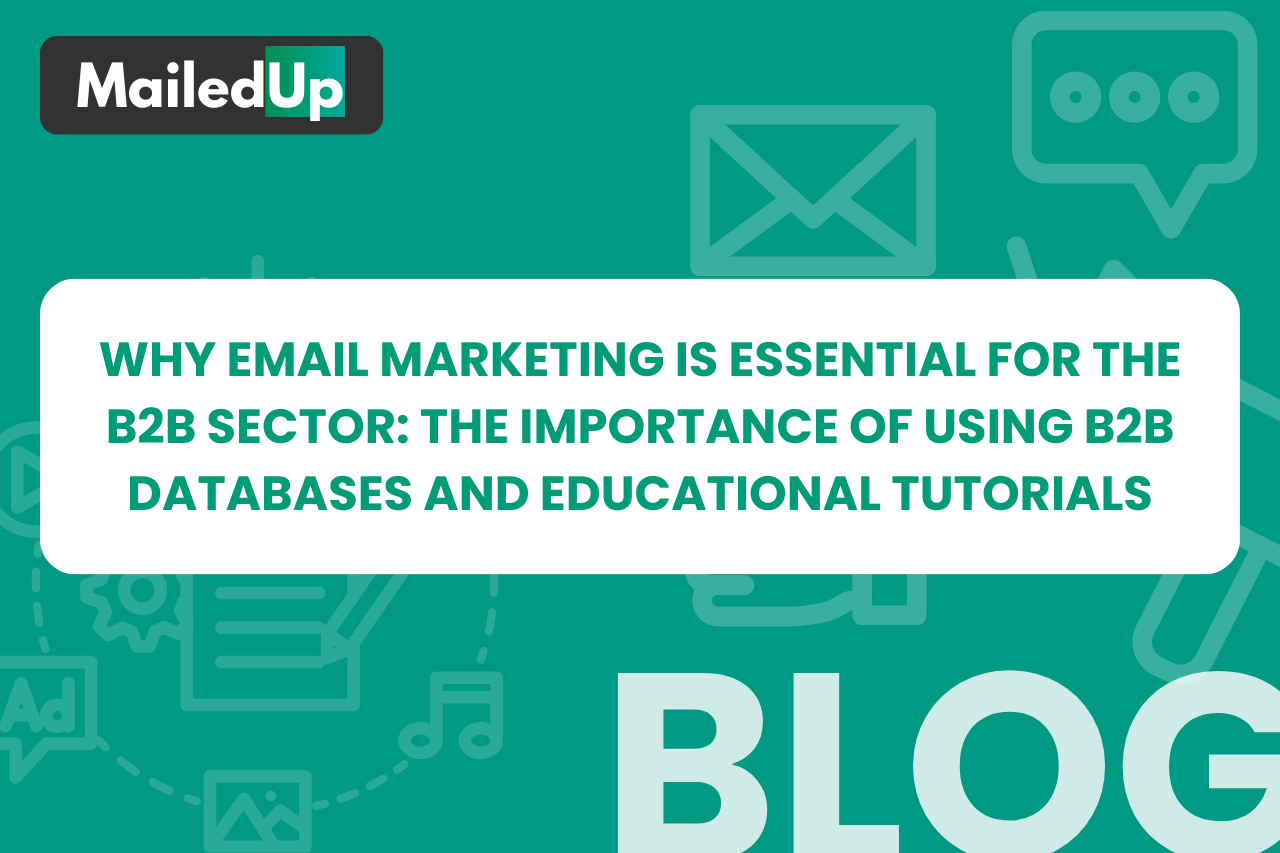In today’s competitive B2B market, email marketing has proven itself to be one of the most powerful tools for engaging potential clients, generating leads, and driving sales. However, the key to successful email marketing lies not only in the content of your newsletters but also in the quality of your database. Using email newsletter software with an integrated B2B database offers a powerful solution that ensures your email campaigns are more effective, streamlined, and compliant with data protection regulations such as GDPR.
In this post, we’ll explore why combining email newsletter software with a robust B2B email database is essential for businesses looking to maximize the impact of their email marketing efforts.
1. The Power of a B2B Database
A B2B database is a goldmine of valuable data—business contact information that includes emails, company names, job titles, industries, and more. Without a solid B2B database, you are essentially shooting in the dark when trying to reach potential clients. Here’s why a high-quality B2B database is indispensable for email marketing success:
- Targeted Outreach: A well-structured B2B database allows you to segment your contacts based on various criteria such as industry, company size, role, or geographic location. This enables you to tailor your emails to specific groups, enhancing the relevance of your messages.
- Personalization: Personalized emails have a higher chance of engagement. With a detailed B2B database, you can customize email content to speak directly to the needs of individual businesses, increasing your chances of conversion.
- Lead Generation: A B2B database gives you access to a wide range of leads, helping you to grow your client base. By focusing on the right contacts—those that are more likely to benefit from your offering—you can significantly improve the return on investment (ROI) of your email campaigns.
2. The Benefits of Using Email Newsletter Software
Email newsletter software is designed to simplify the creation, management, and distribution of email campaigns. It takes the guesswork out of email marketing and provides you with the tools to run successful campaigns from start to finish. Here’s why you need robust email newsletter software integrated with a B2B database:
- Ease of Use: Good email newsletter software is intuitive, allowing even beginners to create professional emails. With drag-and-drop templates, pre-designed layouts, and customizable elements, email software makes it easy to create and distribute newsletters that stand out in a crowded inbox.
- Efficient Campaign Management: Newsletter software makes it easy to manage your campaigns, track results, and optimize future efforts. From planning to execution, the software can handle everything from creating a campaign, selecting the appropriate contacts from your B2B database, scheduling sends, and measuring performance.
- Automation and Time-Saving: Automation allows the software to automatically send emails based on user behavior or pre-set schedules. You can set up automated workflows to send follow-ups, reminders, and special offers without manual intervention.
- GDPR Compliance: A reliable email newsletter software will ensure that your campaigns comply with data protection regulations, helping you obtain proper consent, manage opt-ins and opt-outs, and securely store contact data.
3. Why Integration of Email Newsletter Software and B2B Database is Key
When you combine email newsletter software with a B2B database, you unlock a host of benefits that work together to improve your email marketing efforts:
- Seamless Data Management: Integrating your email software with your B2B database ensures that your contact list is always up-to-date, reducing bounce rates and ensuring accurate targeting.
- Enhanced Segmentation and Personalization: Precise audience segmentation allows you to create tailored campaigns that resonate with each group, increasing engagement and conversions.
- Better Reporting and Analytics: Integration provides real-time insights into campaign performance, helping you refine your strategies based on data-driven decisions.
- Improved Lead Nurturing: Automated workflows enable you to nurture leads with valuable content at the right time, building relationships and moving prospects down the sales funnel.
4. Key Features to Look for in Email Newsletter Software with a B2B Database
When evaluating email newsletter software with an integrated B2B database, ensure the platform provides the following key features:
- Data Segmentation: Advanced segmentation tools for sorting and grouping contacts based on specific criteria.
- Automated Campaigns: Capabilities to set up automated workflows and trigger-based emails.
- Personalization: Dynamic content insertion for creating personalized email experiences.
- Analytics and Reporting: Detailed insights into open rates, click-through rates, and conversions.
- GDPR Compliance: Features for consent tracking, data anonymization, and opt-in/opt-out management.
5. Real-Life Use Case: How Our Software Helps B2B Companies Thrive
Our email newsletter software integrated with a GDPR-compliant B2B database has helped many businesses streamline their email marketing efforts. For example, one of our clients, a software-as-a-service (SaaS) provider, used our platform to segment their contacts by industry and company size. The result was a 50% increase in engagement and a 35% boost in sales conversions after just three months.
The seamless integration of their database with the email marketing software allowed them to automate follow-ups, send personalized content, and ensure all campaigns were GDPR-compliant. This enabled them to focus on building relationships with clients and prospects, while our software took care of the technical details.
Prev Article
The Power of Email Marketing for B2B Sales: Why It’s Still Relevant and Effective
Next Article
The Ultimate Guide to Using a B2B Email Database for Effective Email Marketing





